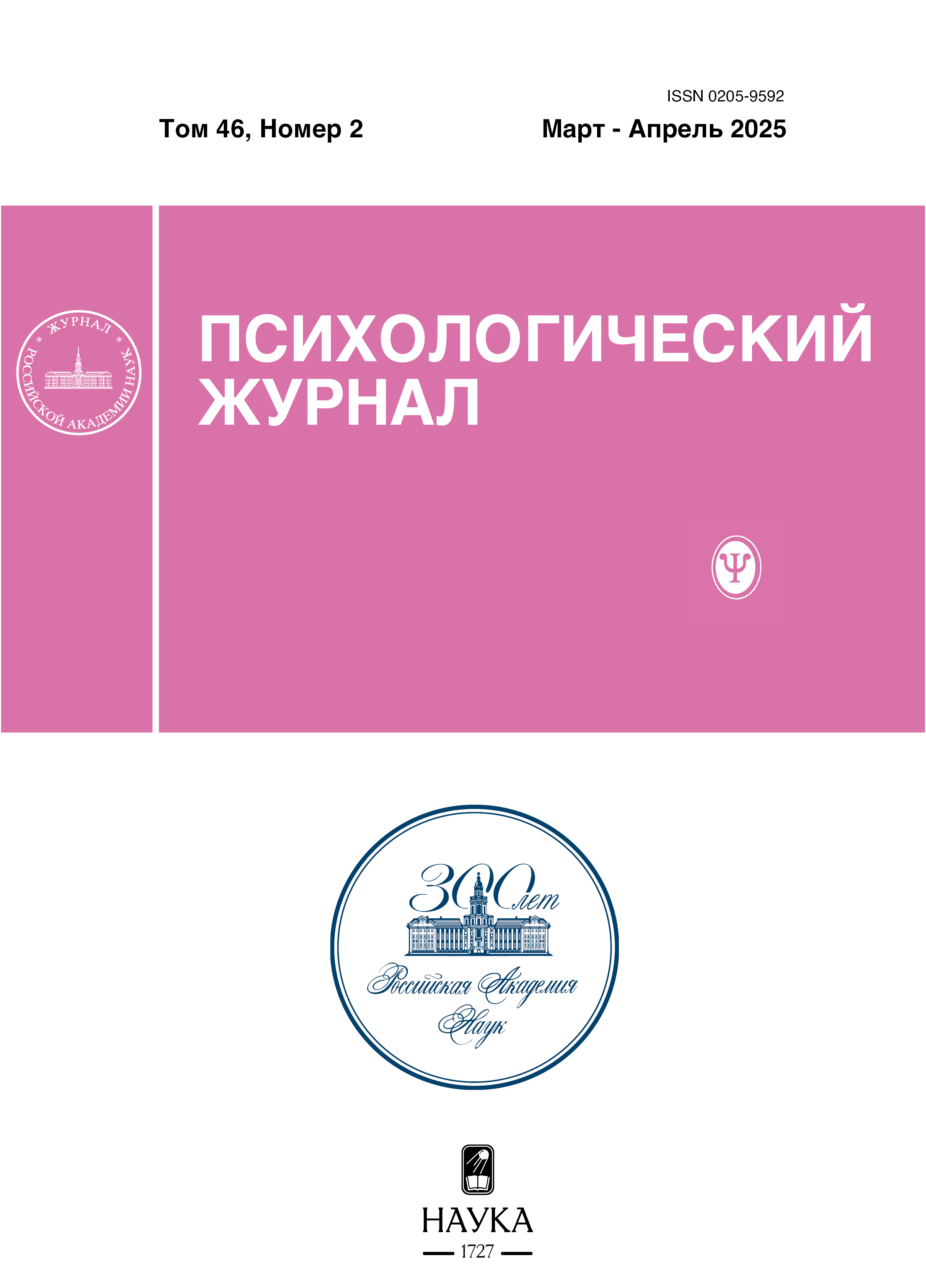Behavior as a processual and dynamic characteristic of person
- Авторлар: Popov L.M.1, Ustin P.N.1
-
Мекемелер:
- Kazan (Privolzhsky) Federal University
- Шығарылым: Том 46, № 2 (2025)
- Беттер: 24-34
- Бөлім: Theoretical and metodological problems in psychology
- URL: https://permmedjournal.ru/0205-9592/article/view/683547
- DOI: https://doi.org/10.31857/S0205959225020034
- ID: 683547
Дәйексөз келтіру
Аннотация
The article presents the main positions of L.I. Antsyferova on personality as a developing systemic integrity, in which all processes and mechanisms that include personality in interaction with the world are integrated into a common semantic basis. The coincidence of the key positions of Antsyferova’s concept of personal behavior (to be responsible for all life on Earth, to follow emotional and empathic morality, to make morality the basis of relationships) with the ideology of the document of experts on the results of the foresight of the century (strategic dialogue with all on Earth, empathic management and empathic education) is shown. The authors analyze “behavior” as a processual and dynamic characteristic of personality from a historical perspective: they show the priority of domestic scientists in presenting the behavior of the organism as a reflexological process (I.M. Sechenov, I.P. Pavlov, V.M. Bekhterev), give approaches to the scientific content of the concept of “behavior”, types of behavior (K. Levin, P. Janet, A. Bandura, J. Rotter). The semantic closeness of the phenomenon “behavior” with the processes: movement, interaction, activity, attitude, transformation is shown. The original position of I.M. Sechenov is given as the highest level of behavior, where the will, high moral principles and responsibility are combined, which is the basic characteristic of behavior. The justification for the use of the concept “activity” in the scientific vocabulary of Soviet psychologists and the necessity of introducing the term “behavior” into the scientific concepts of modern Russian psychology is presented. The functional purpose of the concept “behavior” in correlation with the concepts of “activity” and “communication” is substantiated.
Негізгі сөздер
Толық мәтін
Авторлар туралы
L. Popov
Kazan (Privolzhsky) Federal University
Хат алмасуға жауапты Автор.
Email: Leonid.Popov@inbox.ru
ScD (Psychology), Professor of the Department of Clinical and Personality Psychology, Institute of Psychology and Education
Ресей, 420021, Kazan, st. M. Mezhlauka, bld. 1P. Ustin
Kazan (Privolzhsky) Federal University
Email: pavust@mail.ru
PhD (Psychology), Head of the Department of General Psychology of the Institute of Psychology and Education
Ресей, 420021, Kazan, st. M. Mezhlauka, bld. 1Әдебиет тізімі
- Andreeva G.M. Social’naya psihologiya. Moscow: Aspekt Press, 2014. 363 p. (In Russian)
- Ancyferova L.I. Razvitie lichnosti i problemy gerontologii. Moscow: Publ. “Institute of psychology RAS”, 2004. 415 p. (In Russian)
- Aristotel’. Etika. Politika. Ritorika. Poetika. Kategorii. Minsk: Literatura, 1998. 1391 p. (In Russian)
- Bodalev A.A. Obshchenie kak predmet mezhdisciplinarnogo izucheniya. Psikhologicheskii zhurnal. 2009. Vol. 30. № 2. P. 129–133. (In Russian)
- Bol’shakov V.Yu. Evolyucionnaya teoriya povedeniya. Saint-Petersburg: Publ. Saint-Peterburg State University, 2001. 494 p. (In Russian)
- Bol’shoj psihologicheskij slovar’. Eds. B.G. Meshcheryakov, V.P. Zinchenko. 3rd ed. Saint-Petersburg: Prajm-Evroznak, 2006. 494 p. (In Russian)
- Vilenskaya G.A. Issledovaniya psihologii interneta v “Psihologicheskom zhurnale”: nekotorye itogi i perspektivy. Psikhologicheskii zhurnal. 2019. V. 40. № 4. P. 5–14. (In Russian)
- Vygotskij L.S. Pedagogicheskaya psihologiya. Moscow: Pedagogika, 1991. 480 p. (In Russian)
- Gusejnov A.A. Etika. In: Etika: Enciklopedicheskij slovar’. Moscow: Gardariki, 2001. P. 573–581. (In Russian)
- Gusel’ceva M.S. Problema sub’ekta s pozicii kul’turno-analiticheskogo podhoda. Psikhologicheskii zhurnal. 2020. V. 41. № 2. P. 104–114. (In Russian)
- James U. Psihologiya. Ed. L.A. Petrovskaya. Moscow: Pedagogika, 1991. 367 p. (In Russian)
- Zhuravlev A.L., Nestik T.A. Psihologiya upravleniya sovmestnoj deyatel’nost’yu: Novye napravleniya issledovanij. Moscow: Publ. “Institute of psychology RAS”, 2010. 351 p. (In Russian)
- Zhuravlev A.L., Sergienko E.A. Analiz sovremennyh ponyatij v psihologii. Chast’ I. Opyt sistematizacii ponyatij. Psikhologicheskii zhurnal. 2021. V. 42. № 3. P. 5–15. (In Russian)
- Zhuravlev A.L., Sergienko E.A. Analiz sovremennyh ponyatij v psihologii. Chast’ II. Razrabotka sovremennyh ponyatij uchenymi Instituta psihologii RAN. Psikhologicheskii zhurnal. 2021. V. 42. № 4. P. 5–15. (In Russian)
- Zhuravlev A.L., Sergienko E.A. Sistemno-setevaya organizaciya sovremennyh ponyatij psihologii (na primere razrabotok sotrudnikov Instituta psihologii RAN). Psikhologicheskii zhurnal. 2022. V. 43. № 3. P. 5–14. (In Russian)
- Zejgarnik B.V. Teorii lichnosti v zarubezhnoj psihologii. Moscow: Publ. of Moskow University, 1982. 128 p. (In Russian)
- Kak my i nashi deti prozhivem sleduyushchie 100 let? Rezul’taty forsajta stoletiya. Arhipelag 2121 [Electronic resource]. URL: https://leader-id.storage.yandexcloud.net/upload/117173/cf75ef8e-a7cf-4076-b2f9-d8066db966f5.pdf (accessed: 10.03.2024). (In Russian)
- Leont’ev A.A. Psihologiya obshcheniya. Moscow: Smysl, 1997. 366 p. (In Russian)
- Leont’ev A.N. Problemy razvitiya psihiki. Moscow: Publ. MSU, 1981. (In Russian)
- Lomov B.F. Metodologicheskie i teoreticheskie problemy psihologii. Moscow: Nauka, 1984. 448 p. (In Russian)
- Ponomarev Ya.A. Psihologiya tvorchestva. Moscow: Nauka, 1976. 302 p. (In Russian)
- Rubinshtejn S.L. Bytie i soznanie. Chelovek i mir. Saint-Petersburg: Piter, 2003. 512 p. (In Russian)
- Sechenov I.M. Refleksy golovnogo mozga. Moscow: Publ. AS USSR, 1961. 100 p. (In Russian)
- Soldatova G.U., Vojskunskij A.E. Social’no-kognitivnaya koncepciya cifrovoj socializacii: novaya ekosistema i social’naya evolyuciya psihiki. Psihologiya. Zhurnal Vysshej shkoly ekonomiki. 2021. V. 18. № 3. P. 431–450. (In Russian)
- Ushakov D.V. Intellekt: strukturno-dinamicheskaya teoriya. Moscow: Publ. “Institute of psychology RAS”, 2003. 264 p. (In Russian)
- Filosofskij slovar’. Ed. M.M. Rozental`. 3rd ed. Moscow: Politizdat, 1975. 496 p. (In Russian)
- Frejdzher R., Fejdimen D. Lichnost’: teorii, eksperimenty, uprazhneniya. Saint-Petersburg: Prajm-EVROZNAK, Olma-Press, 2001. 863 p. (In Russian)
- Harlamenkova N.E. Psihologiya lichnosti: ot metodologii k nauchnomu faktu. Moscow: Publ. “Institute of psychology RAS”, 2023. 403 p. (In Russian)
- Yudin E.G. Povedenie. Eds. V.S. Stepin, A.A. Gusejnov, G.Yu. Semigin. Novaya filosofskaya enciklopediya. V. 3. Moscow: Mysl’, 2010. (In Russian)
- Pelaprat E., Brown B. Reciprocity: Understanding online social relations. First Monday. 2012. V. 17. № 10. doi: 10.5210/fm.v17i10.3324
- Zyoud S.H., Sweileh W.M., Awang R. et al. Global trends in research related to social media in psychology: mapping and bibliometric analysis. International Journal of Mental Health Systems. 2018. V. 12. № 4. P. 1–8.
Қосымша файлдар









